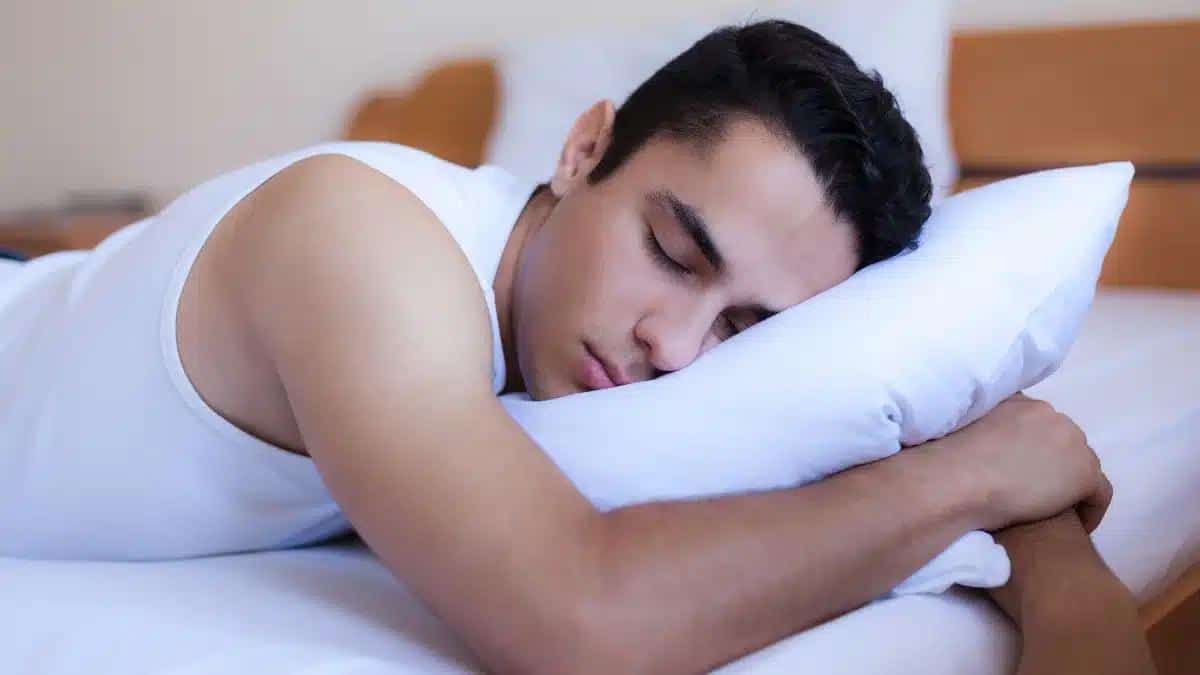Sleep is an important factor for one’s overall health and well-being.
However, many are curious about the relationship between sleep and testosterone.
Even though these two may not seem directly connected, there may be a connection between the quality and duration of sleep and testosterone levels.
Let’s look at the link between sleep and testosterone and explore what happens to testosterone production when you don’t sleep enough.
Relationship between sleep and testosterone
Sleep is an important factor for testosterone production in one’s body.
Poor or irregular sleep can break the Rapid Eye Movement (REM) sleep stage and cause low testosterone levels.
A study states that testosterone levels start increasing on falling asleep and peak during Rapid Eye Movement (REM) sleep.
Research states that poor sleep can also lead to an increase in cortisol levels.
High cortisol levels can cause problems with testosterone production and may lead to hormonal imbalance.
Cortisol: A hormone produced by the adrenal glands that helps manage stress responses, metabolism, and immune function.
However, if sleep can affect testosterone levels, then low testosterone can also affect sleep.
Low testosterone levels may cause sleep problems such as Insomnia.
Therefore, a proper night’s sleep is important to help maintain testosterone, and maintaining testosterone is important for proper sleep.
Can Sleep Apnea cause low testosterone
 Source: YakobchukOlena
Source: YakobchukOlenaYes, Sleep Apnea can cause low testosterone in men.
Sleep Apnea is a serious sleep disorder that leads to breathing problems during sleep.
A study states that Sleep Apnea leads to less REM sleep, less deep sleep, irregular sleep, and less effective sleep.
All the above effects of Sleep Apnea on one’s sleep lead to low testosterone levels.
Additionally, low testosterone in men is a common problem that may cause low libido, Erectile Dysfunction, and other Sexual Dysfunctions.
Consult a doctor if you are experiencing sleep problems or low testosterone.
How much sleep can increase testosterone
Proper sleep can have a positive effect on testosterone production.
It is important to get at least 7 hours of daily uninterrupted sleep for most adults.
Research states that at least 15% of the working population (adults) in the US gets less than 5 hours of sleep a night.
A study found that healthy men who slept only 5 hours daily for a week had their testosterone levels drop by 10% to 15%.
On the other hand, normal aging causes testosterone levels to drop by 1% to 2% per year.
Therefore, improving sleep may help increase testosterone levels in some people.
Key takeaways
There is an important connection between sleep and testosterone.
Getting good and uninterrupted sleep is important as sleep helps with testosterone production in one’s body.
Poor or irregular sleep may lead to low testosterone levels in men.
Additionally, sleep disorders like Sleep Apnea are also responsible for low testosterone and problems with one’s sleep.
However, one may notice improved testosterone levels by getting a good 7-9 hours of sleep daily.
Frequently Asked Questions
Does lack of sleep affect testosterone?
Yes, lack of sleep may affect one’s testosterone level. Getting proper sleep is important for testosterone production and helps maintain hormonal balance. Poor or irregular sleep may cause low testosterone levels in an individual.
Does testosterone help you sleep better?
Yes, maintaining testosterone levels may promote restful sleep cycles and improve sleep quality. However, low testosterone levels may cause sleep issues and problems with testosterone production.
Source Links
Does low testosterone cause sleepiness?
Yes, low testosterone levels can contribute to sleepiness and fatigue, as testosterone is important for maintaining one’s energy levels.
However, low testosterone may also lead to sleep disorders and negatively impact one’s night sleep. This may contribute to the problem of daytime tiredness.
Why does sleep affect testosterone?
Sleep affects testosterone because proper sleep helps with the body’s testosterone production. Testosterone levels increase during the Rapid Eye Movement (REM) sleep stage. Irregular sleep can cause hormonal imbalance and may lead to low testosterone levels.
How can I increase my testosterone while sleeping?
One may boost testosterone while sleeping by getting at least 7 hours of uninterrupted sleep daily. One should maintain a consistent sleep schedule and a comfortable environment to maintain hormonal balance.
When referencing outside resources, GoodrxMedicine always provides full citations. To learn more about the measures we use to maintain the quality of our content, please review our Content Information Policy.











